By Artur Davis, on Tue Jan 3, 2012 at 8:30 AM ET  Nebraska Democrat Ben Nelson’s announcement that he is retiring from the Senate can be seen in three different ways. One is that he simply confronted poor poll numbers, coupled with the politics of a state red enough that Barack Obama is guaranteed to lose it. Nebraska Democrat Ben Nelson’s announcement that he is retiring from the Senate can be seen in three different ways. One is that he simply confronted poor poll numbers, coupled with the politics of a state red enough that Barack Obama is guaranteed to lose it.
Second, Nelson’s demise can be seen as a final verdict on a maneuver that transpired almost exactly two years ago. In case you forgot, Nelson and his Arkansas counterpart, Blanche Lincoln, are the two conservative Democrats who saved the health-care overhaul in late December 2009. Had these two senators stuck to their criticisms of the bill, it would have died in the Senate in late 2009. The bill likely would have been downsized to a modest expansion of Medicaid and some tighter rules for pre-existing illness exclusions.
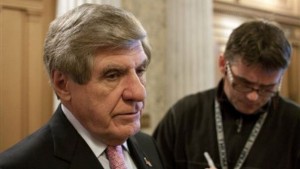 Instead, both senators, reluctant to be blamed for the failure of a 63-year-old Democratic-agenda piece and fearing nationally funded primary opposition from the left, swallowed hard and voted yes. Instead, both senators, reluctant to be blamed for the failure of a 63-year-old Democratic-agenda piece and fearing nationally funded primary opposition from the left, swallowed hard and voted yes.
Neither Lincoln nor Nelson recovered. Lincoln lost in 2010. For Nelson, a significant infusion of off-year independent ad expenditures and relentless attention to Nebraska-based concerns failed to rescue his numbers from the depths they reached after the health-care vote. In Nelson’s case, the failure must be especially galling — given that he traded his vote for a provision that pumped extra federal Medicaid dollars into his state.
The “Nebraska compromise” was never honored, and it was a trade Nebraskans never liked anyway, given their resistance to the rest of the law and, perhaps, their indifference as residents of a low-poverty state to a poverty-based program like Medicaid.
Read the rest of…
Artur Davis: Ben Nelson Retires
By Jonathan Miller, on Sun Jan 1, 2012 at 12:00 PM ET Happy New Year!
I hope 2012 brings you joy, laughter, love, happiness, and many pints of tasty hummus. Here at The Recovering Politician, we plan some exciting new features that we will share with you in the weeks ahead.
For now, as you rest and recover from your New Year’s Eve celebration — and recharge your batteries for a busy January — I wanted to share with you some good reading material.
The first nine months at The Recovering Politician have seen more than 1200 posts from over three dozen contributors. I share my favorites below; please let me know what I missed in the comments section:
 We’ll start with Me because, well…uh…I paid for that microphone. I started the site by explaining Why March Madness Matters and ended the year arguing that Adam Sandler Saved the Jews. In between, I made The Liberal Case for Israel, I outlined Debt Ceilings and Credit Downgrade for Dummies, and shared my Top Five lists for about everything. (My favorite – Jew-ish Gentiles in Pop Culture). All and all, I can’t thank you enough for indulging my part-time, unpaid writing career. We’ll start with Me because, well…uh…I paid for that microphone. I started the site by explaining Why March Madness Matters and ended the year arguing that Adam Sandler Saved the Jews. In between, I made The Liberal Case for Israel, I outlined Debt Ceilings and Credit Downgrade for Dummies, and shared my Top Five lists for about everything. (My favorite – Jew-ish Gentiles in Pop Culture). All and all, I can’t thank you enough for indulging my part-time, unpaid writing career.
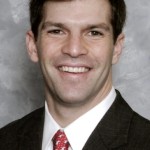 Our most popular writer, hands down, has been contributing RP and former Missouri State Senator Jeff Smith. Jeff’s first piece — the story of his rise into national celebrity, his dramatic fall that resulted in a prison term, and his hopes for redemption — put the RP on the national map, earning recognition from New York magazine’s “Approval Matrix.” Jeff’s followup — about love and sex behind bars — drew in nearly 100,000 readers, literally crashing the Web site. Jeff’s become a national sensation — expect much more from him in 2012. Our most popular writer, hands down, has been contributing RP and former Missouri State Senator Jeff Smith. Jeff’s first piece — the story of his rise into national celebrity, his dramatic fall that resulted in a prison term, and his hopes for redemption — put the RP on the national map, earning recognition from New York magazine’s “Approval Matrix.” Jeff’s followup — about love and sex behind bars — drew in nearly 100,000 readers, literally crashing the Web site. Jeff’s become a national sensation — expect much more from him in 2012.
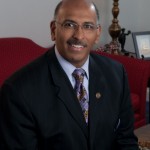 Contributing RP Michael Steele was already a national sensation before he joined the site — you know him as the former Lt. Governor of Maryland, as well as the Chairman of the Republican National Committee. Now a regular contributor to MSNBC, Michael shared with RP readers his vision of the new American Dream, and assessed both President Barack Obama and Supreme Court Justice Clarence Thomas. Over the next few days, Michael will report from the Iowa caucuses; and in the year ahead, he will share his lively take on politics — and other subjects as well. Contributing RP Michael Steele was already a national sensation before he joined the site — you know him as the former Lt. Governor of Maryland, as well as the Chairman of the Republican National Committee. Now a regular contributor to MSNBC, Michael shared with RP readers his vision of the new American Dream, and assessed both President Barack Obama and Supreme Court Justice Clarence Thomas. Over the next few days, Michael will report from the Iowa caucuses; and in the year ahead, he will share his lively take on politics — and other subjects as well.
 Another familiar face at the site in 2011 was another former Lt. Governor of Maryland, contributing RP Kathleen Kennedy Townsend. Kathleen elucidated her well-versed take on faith and politics, while slamming a then-ascendant Rick Perry for misusing faith, defended Sarah Palin(!), and shared her unique perspective as a member of the nation’s most iconic political family. Her most popular piece was on, of all things, home births. Expect the same kind of wide variety from Kathleen at The RP in the coming months. Another familiar face at the site in 2011 was another former Lt. Governor of Maryland, contributing RP Kathleen Kennedy Townsend. Kathleen elucidated her well-versed take on faith and politics, while slamming a then-ascendant Rick Perry for misusing faith, defended Sarah Palin(!), and shared her unique perspective as a member of the nation’s most iconic political family. Her most popular piece was on, of all things, home births. Expect the same kind of wide variety from Kathleen at The RP in the coming months.
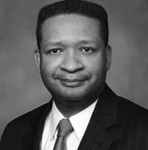 One of the RP’s most prolific contributing RPs was former Alabama Congressman Artur Davis. Artur wrote a fascinating, insightful piece about political authenticity, plunged into the centuries-old debate on race and politics, and explored the Democratic Party’s faith gap. Some of his most popular pieces were book reviews, taking on new works about Harry Truman and Bobby Kennedy. Artur’s not been shy about controversy, angering conservatives by attacking his home state’s “ugly” immigration law, and riling liberals by supporting its new Voter ID law. Don’t expect Artur to pull any punches in 2012. One of the RP’s most prolific contributing RPs was former Alabama Congressman Artur Davis. Artur wrote a fascinating, insightful piece about political authenticity, plunged into the centuries-old debate on race and politics, and explored the Democratic Party’s faith gap. Some of his most popular pieces were book reviews, taking on new works about Harry Truman and Bobby Kennedy. Artur’s not been shy about controversy, angering conservatives by attacking his home state’s “ugly” immigration law, and riling liberals by supporting its new Voter ID law. Don’t expect Artur to pull any punches in 2012.
 Contributing RP and former Missouri state House Speaker Rod Jetton is also one who is not a stranger to controversy. At the peak of his power, Rod was charged with ethics and criminal violations, and while he was cleared of everything, he stepped down to begin his second act. Rod’s 3-part series about his “Success, Scandal and Change” was one of the site’s most widely read, and he concluded the year with a touching 4-part series on his best friend, a fallen Marine. In the middle, he showed off a wry sense of humor in a video interview with his unlikely pal, contributing RP Jeff Smith (you have to see Rod’s imitation of Jeff). Contributing RP and former Missouri state House Speaker Rod Jetton is also one who is not a stranger to controversy. At the peak of his power, Rod was charged with ethics and criminal violations, and while he was cleared of everything, he stepped down to begin his second act. Rod’s 3-part series about his “Success, Scandal and Change” was one of the site’s most widely read, and he concluded the year with a touching 4-part series on his best friend, a fallen Marine. In the middle, he showed off a wry sense of humor in a video interview with his unlikely pal, contributing RP Jeff Smith (you have to see Rod’s imitation of Jeff).
 Jason Atkinson, an Oregon State Senator and contributing RP, underwent a different kind of political recovery — he had to withdraw from a promising gubernatorial campaign after he accidentally shot himself while hunting. He writes about the experience — with graphic charts — in “A Real Political Recovery,” but also created an Internet sensation with short films he directed on more successful outdoor adventures fishing for trout in “Big Mo” and “Half Pounder.” He also showed off his own wicked sense of humor, imitating Abe Lincoln and citing the wisdom of Homer…Simpson that is. Jason Atkinson, an Oregon State Senator and contributing RP, underwent a different kind of political recovery — he had to withdraw from a promising gubernatorial campaign after he accidentally shot himself while hunting. He writes about the experience — with graphic charts — in “A Real Political Recovery,” but also created an Internet sensation with short films he directed on more successful outdoor adventures fishing for trout in “Big Mo” and “Half Pounder.” He also showed off his own wicked sense of humor, imitating Abe Lincoln and citing the wisdom of Homer…Simpson that is.
 Our newest contributing RP, former Virginia Congressional Democratic nominee Krystal Ball, has already generated considerable reader interest with her first piece about Why We Need More Women in Politics. Krystal should know; her first campaign for office was interrupted by a ridiculous media inquiry into pictures taken of her in college; PG-13 pictures that caused a mini-national-sensation only because of Krystal’s gender. As a regular contributor to MSNBC and here at The RP, Krystal will help us view politics in a much different way. Our newest contributing RP, former Virginia Congressional Democratic nominee Krystal Ball, has already generated considerable reader interest with her first piece about Why We Need More Women in Politics. Krystal should know; her first campaign for office was interrupted by a ridiculous media inquiry into pictures taken of her in college; PG-13 pictures that caused a mini-national-sensation only because of Krystal’s gender. As a regular contributor to MSNBC and here at The RP, Krystal will help us view politics in a much different way.
 Finally, I feel very fortunate — and so is the RP Nation — to have convinced my good friend, contributing RP, and former Kentucky Secretary of State, John Y. Brown, III to share his incisive social and political commentary, along with his uproarious sense of humor, at The RP. John Y. helped set the theme and tone of the site with his early piece, “What Do We Do Now?,” in which he offered a 20-question quiz to help readers determine if they were in need of political recovery. More recently, we’ve launched a regular feature, John Y.’s Musings from the Middle, in which he shares his wit and wisdom on topics varying from fruitcake to the death penalty to Lindsay Lohan. We guarantee a lot of laughs, as well as thoughtful advice, in the year ahead. Finally, I feel very fortunate — and so is the RP Nation — to have convinced my good friend, contributing RP, and former Kentucky Secretary of State, John Y. Brown, III to share his incisive social and political commentary, along with his uproarious sense of humor, at The RP. John Y. helped set the theme and tone of the site with his early piece, “What Do We Do Now?,” in which he offered a 20-question quiz to help readers determine if they were in need of political recovery. More recently, we’ve launched a regular feature, John Y.’s Musings from the Middle, in which he shares his wit and wisdom on topics varying from fruitcake to the death penalty to Lindsay Lohan. We guarantee a lot of laughs, as well as thoughtful advice, in the year ahead.
Thanks for joining us in 2011. Stay tuned for a wild and wonderful 2012.
By Artur Davis, on Thu Dec 29, 2011 at 8:30 AM ET  Mitt Romney is alive again. The revived pulse is measured in several forms, from a substantial narrowing in Newt Gingrich’s lead in the Gallup national tracking poll, to a Rasmussen survey putting Romney on top in Iowa, to the persistent and growing advantage Romney holds in New Hampshire. Mitt Romney is alive again. The revived pulse is measured in several forms, from a substantial narrowing in Newt Gingrich’s lead in the Gallup national tracking poll, to a Rasmussen survey putting Romney on top in Iowa, to the persistent and growing advantage Romney holds in New Hampshire.
Gingrich has some of his own propensities to blame. Before the heroic comeback story, the saga of a man grittily fighting back from despair, could take hold, Gingrich turned triumphalist: in his immodest account, he was redesigning campaign strategy in the way Sam Walton and Ray Kroc invented the modern consumer market. He reverted to the cerebral analyst coldly assessing the trend-lines.
 Then, the politician who eloquently denounced intra-party infighting unveiled a caustic edge: the pundits who admired the smoothness of his jabs in the ABC debate were too tone-deaf to hear the jeers in the room when the guy who was forced out of his speakership ridiculed Romney for losing an election. Then, the politician who eloquently denounced intra-party infighting unveiled a caustic edge: the pundits who admired the smoothness of his jabs in the ABC debate were too tone-deaf to hear the jeers in the room when the guy who was forced out of his speakership ridiculed Romney for losing an election.
Nor has it helped Gingrich that the entirety of the Republican philosopher wing has assailed him, from the old lions, David Brooks and Charles Krauthammer, to the young turks like Ross Douthat, to the venerable National Review. Not one of them is mandatory reading in the early states, but the intelligentsia do matter in the corridors of New York and Washington, where money and endorsements should have been flowing to a newly minted front-runner with stature. The case they have made is personal and cutting, and reminds the GOP elite of why Gingrich was consigned to disgrace.
Read the rest of…
Artur Davis: Romney Revived
By Artur Davis, on Fri Dec 23, 2011 at 8:30 AM ET  The political cliché of the moment is “authenticity”, which its most avid users describe as a consistency of stated political beliefs; it is regarded as the moral opposite of “flip-flopping” or “pandering”. By the standards of the “authenticity” test, Mitt Romney is deeply flawed, having shifted views on the usefulness of healthcare reform, the legality of abortion, the literalness of the Second Amendment, and having discovered new reservations around the rights of gays and the claims of illegal immigrants. The political cliché of the moment is “authenticity”, which its most avid users describe as a consistency of stated political beliefs; it is regarded as the moral opposite of “flip-flopping” or “pandering”. By the standards of the “authenticity” test, Mitt Romney is deeply flawed, having shifted views on the usefulness of healthcare reform, the legality of abortion, the literalness of the Second Amendment, and having discovered new reservations around the rights of gays and the claims of illegal immigrants.
This is a fair enough description. Romney rose as a Republican fending for votes in the most liberal state, Massachusetts, and neither his run against Ted Kennedy nor his governorship sounded very much like the standard form conservative trolling for early state Republicans today.
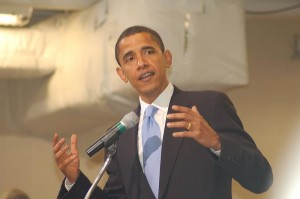 But the “authenticity” test finds fault in unexpected places. Barack Obama gets mixed grades at best. In the span from 2003 to 2008, his criticisms of the death penalty gave way to support for extending it to non death offenses like sexual abuse of minors; his support for stiffer gun laws turned into an endorsement of the Supreme Court’s rejection of tough local gun restrictions. The Patriot Act he assailed during the Senate campaign was a thing he voted to renew as a senator. As president, the forthright critic of non-judicial detention of suspected foreign terrorists has more or less copied the last administration’s playbook on the same subject. The candidate who jabbed his principal Democratic opponent for wanting to require that individuals purchase health insurance is now a president who has converted to the “mandates” cause. But the “authenticity” test finds fault in unexpected places. Barack Obama gets mixed grades at best. In the span from 2003 to 2008, his criticisms of the death penalty gave way to support for extending it to non death offenses like sexual abuse of minors; his support for stiffer gun laws turned into an endorsement of the Supreme Court’s rejection of tough local gun restrictions. The Patriot Act he assailed during the Senate campaign was a thing he voted to renew as a senator. As president, the forthright critic of non-judicial detention of suspected foreign terrorists has more or less copied the last administration’s playbook on the same subject. The candidate who jabbed his principal Democratic opponent for wanting to require that individuals purchase health insurance is now a president who has converted to the “mandates” cause.
Obama has gotten no real grief for directions in the past several years that don’t match the things he said in the heat of campaigns to win liberal hearts in Illinois, and then the country. In contrast, it is George Bush who draws considerable ire for staying fixed in stone on Iraq, even when the results were a quagmire that nearly undermined the success of dethroning Saddam. If memory serves, Bush also won not much praise for sticking to his moderate stances on immigration: the Texas governor who aggressively courted Latinos was the same president who infuriated his base for favoring a path to citizenship for illegal immigrants.
Read the rest of…
Artur Davis: Authenticity and Politics
By Artur Davis, on Tue Dec 20, 2011 at 12:00 PM ET  John Boehner and House Republicans are no winners here. They had a chance to paint a payroll tax cut as a threat to Social Security in early 2009 and they squandered it. Left without a substantive case, they are stuck arguing process and minutiae, and look disorganized on top of it. John Boehner and House Republicans are no winners here. They had a chance to paint a payroll tax cut as a threat to Social Security in early 2009 and they squandered it. Left without a substantive case, they are stuck arguing process and minutiae, and look disorganized on top of it.
But before Democrats salivate too much, the trend in 2011 was that every time Congress descended into bickering, Barack Obama suffered collateral damage. For independents, congressional dysfunction underscored Obama’s failure to alter the gridlock in Washington.
The saving grace for both sides: in a week where the country is finishing its Christmas shopping or making travel plans, it’s a tree falling too far in the forest to make much of a sound.
(Cross-posted, with permission of the author, from Politico’s Arena)
By Artur Davis, on Mon Dec 5, 2011 at 8:30 AM ET  Harry Truman is the one president widely admired today who was generally reviled in his own times. There was no cult of personality around Truman while he was in the White House; to the contrary, he eventually logged the lowest approval ratings in Gallup’s history, just nudging out Richard Nixon on the eve of resignation. His legislative record was anemic. He failed to curb the anti-communist fervor known as McCarthyism, and the carnage of the Korean War is part of his resume. Harry Truman is the one president widely admired today who was generally reviled in his own times. There was no cult of personality around Truman while he was in the White House; to the contrary, he eventually logged the lowest approval ratings in Gallup’s history, just nudging out Richard Nixon on the eve of resignation. His legislative record was anemic. He failed to curb the anti-communist fervor known as McCarthyism, and the carnage of the Korean War is part of his resume.
The fact Truman endures is a testament to two factors: the first, his exemplary decision to assert American leadership on behalf of democratic elements under siege, from Greece to Israel, denied the Soviet Union ownership of the second half of the 20th Century. Second, he won a campaign, improbably, heroically, and defiantly in the face of outlandish odds.
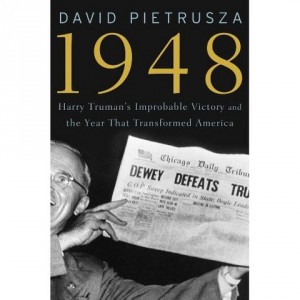 Click on picture above to purchase book That second event is the subject of David Pietrusza’s latest presidential campaign history, “1948”, a worthy successor to “1920: The Year of the Six Presidents”, a superb recounting of a largely forgotten political season, and “1960: JFK v. LBJ v. Nixon”, which manages to shed fresh details on that year’s epic. Pietrusza opts for the brisk narrative/character sketch (think “The Making of the President”, but with no pretense of grandeur), over the minute retelling of every seminal event that weighs down Edmund Morris’ series on Teddy Roosevelt or John Milton Cooper’s well regarded 2008 biography of Woodrow Wilson. It is less grand history than a jaunty, essayist’s rendition—imminently readable and revealing.
The best recalled aspect of “1948” is the seemingly helpless state Truman found himself in at the outset of the race: his Democratic Party was deeply split, with a sizable number of liberals regarding Truman as simultaneously too adventurous with his foreign policy and too feckless on the domestic side. The southern wing of the party was equally disgruntled, and a portion of it was intent on generating an electoral college deadlock that would make the preservation of segregation for another generation the ticket for a deal. The country seemed fatigued with Rooseveltian liberalism, and the Republican front-runner, New York Governor Tom Dewey, seemed inoffensive and competent enough to win easily.
Read the rest of…
Artur Davis: David Pietrusza’s “1948”
By Artur Davis, on Fri Dec 2, 2011 at 8:30 AM ET  I would guess that Barney Frank’s retirement is fifty percent disgust at the rancor of modern campaigns – his 2010 win was brutal and expensive – and fifty percent a recognition that whether Barack Obama wins or loses, there is virtually no chance of a winning liberal legislative agenda in the near future. I would guess that Barney Frank’s retirement is fifty percent disgust at the rancor of modern campaigns – his 2010 win was brutal and expensive – and fifty percent a recognition that whether Barack Obama wins or loses, there is virtually no chance of a winning liberal legislative agenda in the near future.
And yes, Frank and Charlie Gonzalez are signs of a trend that will sweep in another five to ten senior Democrats in the next sixty days.
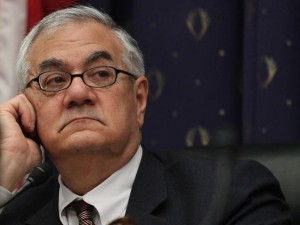 There is no serious Democrat in Washington who expects the House majority to change hands, and while they expect Obama to win, Hill Democrats are no fans of this White House. They see a second term of small bore initiatives, deficit reduction, jockeying over the successors to Obama and Pelosi, and retrenchment on healthcare and financial reform. There is no serious Democrat in Washington who expects the House majority to change hands, and while they expect Obama to win, Hill Democrats are no fans of this White House. They see a second term of small bore initiatives, deficit reduction, jockeying over the successors to Obama and Pelosi, and retrenchment on healthcare and financial reform.
It’s not what they signed up for and a lot of them are heading for home, or “up or out” statewide races.
(Cross-posted, with permission of the author, from Politico’s Arena)
By Artur Davis, on Mon Nov 28, 2011 at 8:30 AM ET  Occupy Wall Street is, in its current state, visible, noisy, and not terribly relevant. How can you stay relevant when the first major policy item on your agenda – student loan forgiveness for the unemployed and the low-income – is already law, and the second–substantial tax hikes for the wealthy – has already been claimed by one of the major political parties? Occupy Wall Street is, in its current state, visible, noisy, and not terribly relevant. How can you stay relevant when the first major policy item on your agenda – student loan forgiveness for the unemployed and the low-income – is already law, and the second–substantial tax hikes for the wealthy – has already been claimed by one of the major political parties?
Two other gripes with OWS: first, every modern progressive movement has derived its moral authority from its efforts to elevate some marginalized class of Americans. This is the first left leaning movement whose rhetorical goal is to pull one class of Americans down to size. It is self-consciously divisive in a way that blacks, women and gays never were.
Finally, while the 99 percent is a glib, clever phrase, it literally links the interest of a hungry child in the Mississippi Delta to those of a six figure accountant whose mortgage is underwater. If you are going to mimic the symbols of Dr. King’s Poor Peoples Campaign, at least have the depth to say something specific about poor people.
(Cross-posted, with permission of the author, from Politico’s Arena)
By Artur Davis, on Thu Nov 17, 2011 at 8:30 AM ET
 When approval of Congress barely crosses the 10% Mendoza line–an old baseball slang named after a journeyman player who consistently batted .100–it’s safe to say that improving their stock portfolio should not be a major fixation for senators and representatives. Recent press reports regarding stock trading by congressmen has touched one more nerve for a public that already believes politicians operate in their own gilded, privileged world. When approval of Congress barely crosses the 10% Mendoza line–an old baseball slang named after a journeyman player who consistently batted .100–it’s safe to say that improving their stock portfolio should not be a major fixation for senators and representatives. Recent press reports regarding stock trading by congressmen has touched one more nerve for a public that already believes politicians operate in their own gilded, privileged world.
I am still, however, a bit torn here–not because I did the same thing (for what its worth, I never owned stocks during the time I served in Congress) and not because I think it’s a good thing to use an elected office to further personal profit. The problem I have is that the controversy, in all its unseemliness, spares us some needed introspection: about how narrow some of our financial laws are, and about what some ill-timed trades say about a larger culture that virtually all us aided and abetted.
First, the laws and their relatively limited state. The misconceptions around insider trading are extensive, even in informed circles. Its not well known, for example, that you can search the whole federal criminal code and never find the term “insider trading”; the concept is a creation of how judges and regulators have interpreted the securities fraud laws (which were written in the thirties, before E-Trade, before money markets flourished, before stocks became a middle class instrument to fund colleges and cushion retirements).
 The prevailing myth is that “insider trading” means you can’t buy or sell stocks based on “confidential information”. That’s actually wrong–the courts and regulators have focused on only one class of violations–hinging on individuals who have a specific legal or fiduciary duty to the source of the information. It’s true that you can be on the hook for criminal liability if you get information from someone that you know breached their fiduciary responsibilities–but it can be tough to prove what a trader knows about the ties between his source and the company whose confidences are being breached. The prevailing myth is that “insider trading” means you can’t buy or sell stocks based on “confidential information”. That’s actually wrong–the courts and regulators have focused on only one class of violations–hinging on individuals who have a specific legal or fiduciary duty to the source of the information. It’s true that you can be on the hook for criminal liability if you get information from someone that you know breached their fiduciary responsibilities–but it can be tough to prove what a trader knows about the ties between his source and the company whose confidences are being breached.
Read the rest of…
Artur Davis: On Congressional Insider Trading
By Artur Davis, on Fri Nov 11, 2011 at 8:30 AM ET
 We never stop fretting over race and politics, largely because neither side of the political divide will let the subject go. Most Democrats I know are convinced that Barack Obama’s struggles are related partly to his race and anxieties over the rise of a multi-cultural power base. The accusations that Herman Cain harassed or aggressively propositioned at least four white women have stirred a new tempest, with conservative defenders of Cain suspecting race is at the bottom of the uproar, and liberals assuming that in the words of one pundit, “the layer of black sexuality” is what will kill off Cain with Republicans We never stop fretting over race and politics, largely because neither side of the political divide will let the subject go. Most Democrats I know are convinced that Barack Obama’s struggles are related partly to his race and anxieties over the rise of a multi-cultural power base. The accusations that Herman Cain harassed or aggressively propositioned at least four white women have stirred a new tempest, with conservative defenders of Cain suspecting race is at the bottom of the uproar, and liberals assuming that in the words of one pundit, “the layer of black sexuality” is what will kill off Cain with Republicans
Powerful stuff in a climate that was supposed to be “post-racial”. It’s a vexing enough subject that absurdities are flourishing on both sides: attributing Obama’s slide to race rather than the economy ignores the color-blindness descendants of Confederate soldiers displayed In Virginia and North Carolina in voting for Obama in 2008, or for that matter, the 50% plus approval ratings Obama enjoyed in Alabama and Mississippi in the spring of 09. Is the theory that they just didn’t look hard enough at Obama’s photos? Similarly, asserting that Cain is in a predicament because of race assumes Mitt Romney would get a pass if it was discovered that multiple women at Bain Capital had accused him of harassment and that Bain had paid money to resolve the claims.
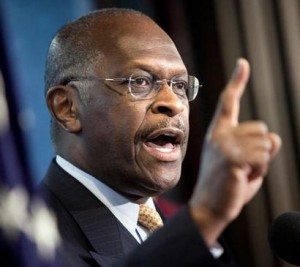
There are obvious straw-men at work here who are pretty easy to knock down. I generally agree with Ross Douthat of the New York Times, a smart, thoughtful center right columnist, who writes this week that in politics, “race matters, but ideology matters much, much more.” But I do find myself agreeing with one argument in circulation and it is worth addressing because it will matter long after Cain is done and collecting lecture fees.
Yes, Cain does inspire a special kind of loathing on the left for reasons that have something to do with his skin color. Full disclosure: I’ve been through a few of these fires, as the only black congressman who opposed Obamacare, as the rare African American politician who supports voter ID laws. I’ve seen it up close–there is a predisposition in some liberal circles to think that a black politician who deviates from the liberal line is “inauthentic” and dishonest, that he is deceptively trying to curry favor with white conservatives at the expense of his own. There is also a perverse kind of resentment that the “strategy” may work, that a black who can win conservative support can cut in line and therefore advance more quickly, that such a candidate will be spared the need to court certain power-brokers.
Read the rest of…
Artur Davis: What the Cain Scandal Reveals About Race & Politics
|
|
 Nebraska Democrat Ben Nelson’s announcement that he is retiring from the Senate can be seen in three different ways. One is that he simply confronted poor poll numbers, coupled with the politics of a state red enough that Barack Obama is guaranteed to lose it.
Nebraska Democrat Ben Nelson’s announcement that he is retiring from the Senate can be seen in three different ways. One is that he simply confronted poor poll numbers, coupled with the politics of a state red enough that Barack Obama is guaranteed to lose it. Instead, both senators, reluctant to be blamed for the failure of a 63-year-old Democratic-agenda piece and fearing nationally funded primary opposition from the left, swallowed hard and voted yes.
Instead, both senators, reluctant to be blamed for the failure of a 63-year-old Democratic-agenda piece and fearing nationally funded primary opposition from the left, swallowed hard and voted yes.




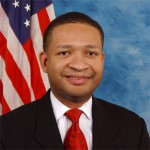
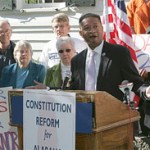

















Follow Artur: